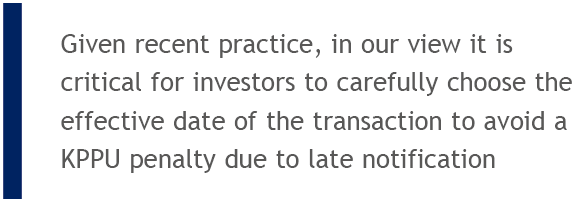
Published in Asian-mena Counsel: Mergers & Acquisitions Special Report 2019
By Ferdinand Jullaga Tambunan and Albertus Andhika, MKK
The government has recently promulgated several regulations that are beneficial for M&A transactions.
T he regulatory aspect of mergers and acquisitions often plays a vital role in the success or failure of the transaction and can affect the transaction structure. This article sets out our analysis of Indonesian regulatory innovations recently introduced and the impact on investors in the course of M&A involving Indonesian companies.
he regulatory aspect of mergers and acquisitions often plays a vital role in the success or failure of the transaction and can affect the transaction structure. This article sets out our analysis of Indonesian regulatory innovations recently introduced and the impact on investors in the course of M&A involving Indonesian companies.
The Indonesian Investment Coordinating Board (BKPM) released its 2018 report and stated that investment had reached Rp721.3 trillion (US$51.5 billion), an increase of 4.1 percent compared to that of 2017. Indonesia also ranked 45th in the 2018 Global Competitiveness Report published by the World Economic Forum, a higher ranking than in 2017. The improvement occurred because, according to Asian Development Outlook 2018, Indonesia recently experienced robust GDP growth of 5.2 percent. The rate is higher than in that of most other in South East Asian countries, such as Singapore and Malaysia. In addition, Standard & Poor’s and Moody’s ranked Indonesia’s credit rating as investment grade, making Indonesia an attractive target for investment.
In 2018, the Indonesian government promulgated several regulations that are beneficial for doing business, such as establishment of a new online system called Online Single Submission (OSS), which simplifies the establishment of a company in Indonesia, the simplification of foreign worker regulations and tax treatment incentives for venture capital. Further, the Indonesian government also issued rules on declaring beneficial ownership to help the government protect Indonesia’s business sector from money laundering practices. We also saw more case precedents regarding the importance of notifying Indonesia’s Commission for the Supervision of Business Competition (KPPU) of M&A transactions to avoid late penalties. These regulatory reforms and implementation thereof have led to numerous M&A transactions in Indonesia throughout 2018, and it is expected that this trend should continue through 2019.
Indonesia’s OSS cutting red tape for M&A transactions
As part of the commitment of the Indonesian government to make the Indonesian market lucrative and efficient for investment, the Indonesian government issued Government Regulation No. 24 of 2018 on Electronically Integrated Licensing Services (GR 24/2018), which has been effective since June 21, 2018. GR 24/2018 introduced the OSS system, which integrates the bureaucracy of multiple government institutions into a one single system. OSS shortens the licensing process for corporate actions (including M&A) and simplifies licensing procedures for greenfield foreign direct investment by facilitating the applications for investment licences electronically.

In respect of M&A, GR 24/2018 introduces a shorter timeframe for M&A transactions. Previously, M&A conducted by a foreign company required the target company or merged company to obtain approval from BKPM prior to the closing of the transaction. Under GR No. 24/2018, such approval is no longer needed, which cuts the time required to obtain BKPM approval (which usually takes seven days or even more). In practice upon issuance of GR 24/2018, the target company or the merged company are no longer required to have BKPM approval, and such company can immediately amend its articles of association to reflect the new shareholding structure. After amending its articles of association, such company then needs to liaise with a public notary to restate such amendment in a notarial deed.
Following the execution of a notarial deed by the relevant parties, the notary will then submit a notification or request for approval to the Minister of Law and Human Rights (MoLHR) regarding such amendment via the general legal administration online system (AHU Online System). Subject to the company’s obligation fulfilment to create its OSS account, upon such notification, the company’s OSS account will automatically reflect the amendment, as it is connected to the AHU Online System. Investors, however, should also be aware that OSS is a self-declaration system, and it creates a post-audit obligation to the relevant government agencies with respect to the submitted OSS application. This means investors should accurately assess their compliance towards prevailing regulations (eg, compliance with regard to the shareholding limitation under Indonesia’s Investment Negative List or other requirements depending on the line of business of the relevant Indonesian company) before closing the M&A transaction, and this compliance assessment is crucial to prevent the M&A transaction from being possibly cancelled in the future by the government.
Simplification of licensing procedures for foreign workers
Foreign investors typically appoint designated people to hold positions in the target company or merged company, most likely a member of the Board of Commissioners. In the past, employing foreign workers required a significant amount of time due to the complex licensing process, where the company as employer had to obtain an expatriate work permit (Izin Menggunakan Tenaga Kerja Asing, or IMTA) in addition to a Foreign Manpower Utilisation Plan (Rencana Penggunaan Tenaga Kerja Asing, or RPTKA).
Following promulgation of Presidential Regulation No. 20 of 2018 on Expatriate Manpower Utilisation (PR 20/2018), which revoked Presidential Regulation No. 72 of 2014 on Utilisation of Expatriate Manpower and Implementation of Education and Training for Supporting Workers For Expatriate, the Indonesian government has cut the red tape to employ foreign workers, meaning that a company only needs to obtain RPTKA. There is no longer a requirement to obtain IMTA. Please note, however, that other licensing requirements, such as Limited Stay Visa and Limited Stay Permit for expats still apply. PR 20/2018 provides that expatriates can apply for a Limited Stay Visa and Limited Stay Permit simultaneously.

Income tax treatment for venture capital
In the last five years, numerous Indonesian technology companies have been acquired or funded by global venture capital. Some Indonesian technology companies even achieved unicorn status after receiving billion dollars in investment from venture capital. The government set out the Road Map for e-Commerce development for 2017-2019 in Presidential Regulation No. 74 of 2017. As part of the commitment of the government to support its e-commerce investment programme, the Minister of Finance issued Regulation No. 48 of 2018, regarding Tax Treatment for Venture Capital’s Investment in Micro, Small and Medium Enterprises (MOF 48/2018), which provides an incentive in the form of income tax treatment to an
Indonesian established venture capital firm that makes an equity investment in micro, small and medium enterprises. MOF 48/2018 categorised micro, small and medium enterprises as companies that recorded net sales of no more than Rp50 billion. The income tax treatment provided under MOF 48/2018 is a tax treatment that treats the dividend earned by venture capital as part of the equity investment as non-taxable income. However, this income tax treatment also has a limitation, whereby an equity investment made by a foreign venture capital firm is not subject to this income tax treatment. In other words, only a venture capital company that is established in Indonesia by way of foreign direct investment or local investment can enjoy such income tax treatment. In addition, the income tax treatment is only given for 10 years of investment, and the company that receives the investment cannot be a publicly-listed company.
Recent practice of Indonesian competition law
In Indonesia, any company conducting mergers, consolidations, and acquisitions must notify the KPPU of the transaction within 30 working days post-transaction. Unlike in other countries where M&A transactions usually can only be executed if the parties have received the green light from the competition agency, Indonesia applies a post-audit system and therefore it is possible for the KPPU to cancel the transaction if the KPPU determines that such transaction has created a monopoly or unfair business competition. There are minimum thresholds for such notification obligation, namely, combined assets of the parties exceeding Rp2.5 trillion and/or the combined sales of the parties exceeding Rp5 trillion. KPPU is authorised to impose a penalty to companies that are late in notifying the KPPU of such a transaction, and such penalty will be in the amount of Rp1 billion per day of delay, with a maximum penalty of Rp25 billion.

KPPU recorded 70 M&A deals in 2018 that met the threshold for M&A notification to the KPPU with a total value of approximately Rp150 trillion. In 2018, there was a case where KPPU imposed a penalty against a foreign direct investment company for being late in notifying an acquisition. Based on the information available to the public, the case revolved around a different perception between the KPPU and the company in determining the day the transaction occurred. In this case, the KPPU determined the effective date of the transaction based on the date of the evidence of notification to MoLHR while the company determined that the effective date of the transaction should be based on the approval they received from BKPM where such approval was given 19 days after the company recorded its transaction with the MoLHR. As a result of the late notification, the company had to pay a penalty in the amount of Rp2.8 billion to the Indonesian government. Given recent practice, in our view it is critical for investors to carefully choose the effective date of the transaction to avoid a KPPU penalty due to late notification.
Beneficial ownership
In an effort to eradicate money laundering and terrorism, the Indonesian government promulgated Presidential Regulation No. 13 of 2018, regarding Implementation of the Principle of Recognising Beneficial Ownership of Corporations for the Prevention and Eradication of Money Laundering and Criminal Acts of Terrorism Funding (PR 13/2018), which went into effect on March 5, 2018. PR 13/2018 created an obligation for all types of corporations established in Indonesia to report the structure of their beneficial ownership. PR 13/2018 determines beneficial ownership in a company as any individual that meets any of the following criteria:
- Holds at least 25 percent of a company’s shares;
- Holds at least 25 percent of the total voting rights;
- Receives at least 25 percent of the company’s yearly profits
- Has control to appoint or dismiss the board of directors and board of commissioners;
- Has the power to affect or control the company without having to obtain authorisation from any party;
- Receives benefits from the company’s activities; or
- Is the true owner of the funds used for the ownership of the company’s shares.
By considering the criteria of beneficial ownership above, PR 13/2018 has direct implications for companies that have an economic benefit (such as dividends) and control (such as voting rights) in a particular company that have been assigned to an outside party (non-shareholders) under a contractual arrangement. The disclosure of beneficial ownership might create an additional obligation for the beneficial owner, such as in the form of taxation or sanctions for violating certain regulations. Foreign investors considering entering Indonesia through greenfield foreign direct investment or M&A or a contractual arrangement should consider the implication of PR 13/2018 on their business plan. Regardless of the above, issuance of PR 13/2018 indicates that the Indonesian government has started to improve transparency in business activities to promote legal certainty in doing business in Indonesia.
Conclusion
The Indonesian government’s regulatory innovations in 2018 have had a positive effect on M&A since the newly-established OSS system has shortened the lengthy procedure to close an M&A transaction. Simplification of the procedure to obtain a foreign worker’s permit and income tax treatment for venture capital companies have provided significant benefits for foreign investors who wish to conduct business in Indonesia. The introduction of rules on beneficial ownership disclosure improves transparency and legal certainty in Indonesia. The recent KPPU practice in interpreting provisions under GR 57/2010 related to notification in M&A transactions gives a clear perspective on the manner in which KPPU determines the effective date of a M&A transaction.
In 2019, as promised by the Indonesian government through the 16th economic policy package on November 16, 2018 (economic policy package), we expect the Indonesian government to issue a new negative investment list that will replace Presidential Regulation No 44 of 2016, regarding Lists of Business Fields that are Closed and Business Fields that are Conditionally Open to Investment. According to the economic policy package, the new negative list that will be issued will open up 54 new lines of business for up to 100 percent foreign investment.

E: ferdinand.jullaga@mkklaw.net
E: albertus.andhika@mkklaw.net
C lick Here to read the full issue of Asian-mena Couddnsel: Mergers & Acquisitions Special Report 2019.
lick Here to read the full issue of Asian-mena Couddnsel: Mergers & Acquisitions Special Report 2019.














 Mochtar Karuwin Komar (MKK)
Mochtar Karuwin Komar (MKK) Emir Kusumaatmadja
Emir Kusumaatmadja Mulyana
Mulyana







